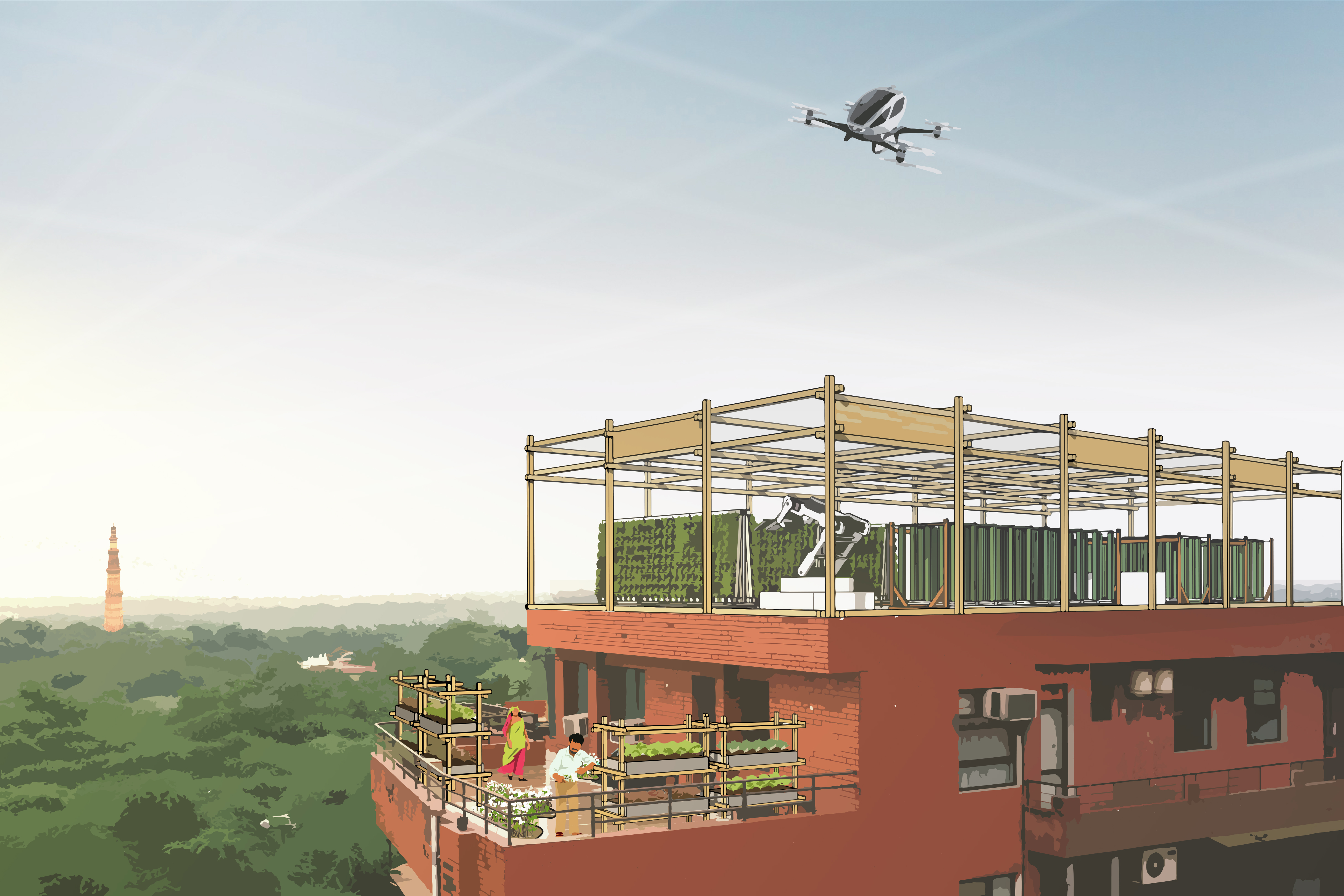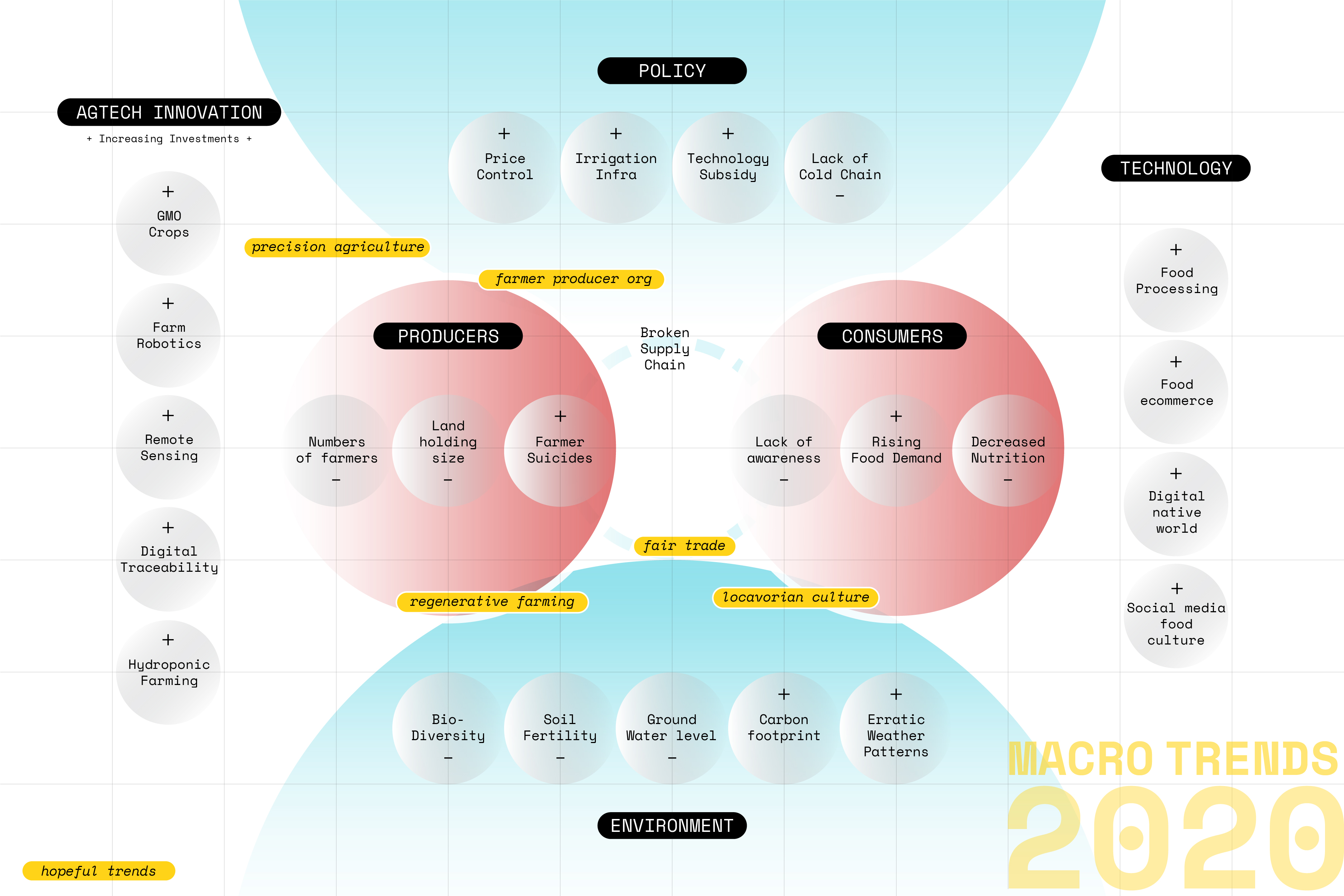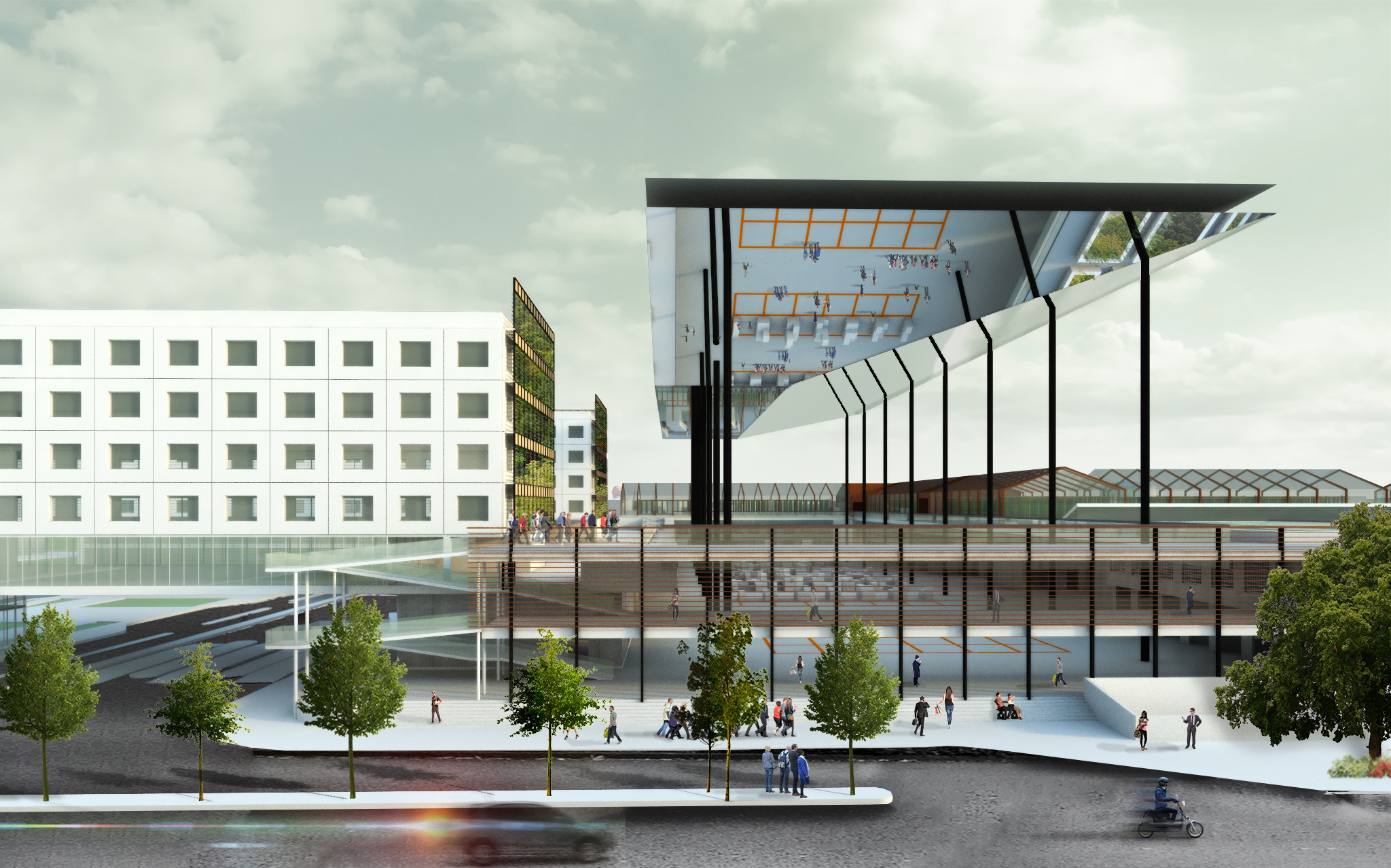
DELHI AGRO-CITY 2050
Who is to feed our megacity?
As a city experiencing rapid urbanization and soon to be the most populous in the world, Delhi offers a particularly relevant environment to study the integration of agricultural practices within a city.
The project uses research and speculation to see how farmers and consumers could cohabit Indian cities and tackle food production challenges together. How might typological interventions enhance the role that urban infrastructure like farmer markets play?
As a city experiencing rapid urbanization and soon to be the most populous in the world, Delhi offers a particularly relevant environment to study the integration of agricultural practices within a city.
The project uses research and speculation to see how farmers and consumers could cohabit Indian cities and tackle food production challenges together. How might typological interventions enhance the role that urban infrastructure like farmer markets play?

Where is our food system headed?
With farmers extremely marginalised and consumers unaware, the future raises some critical questions for Delhi's food systems.
Who will grow our food?
The number of farmers in India has been falling as rural India slowly adapts a non-farm economy. Lack of incentives and favourable conditions for small land-holding farmer and farm labour poses a risk of losing agricultural skill and wisdom.
Who’s hungry and who’s not?
By 2050, India’s population would reach 1.7 billion people and the country expects 55-60% of that to be living in cities. The population in Delhi is expected to cross 35 million and food demand is expected to rise two-folds.
Can food systems be climate-resilient?
Rising temperatures, erratic weather patterns and CO2 concentration are expected to impact crop growth and endanger our food system significantly. Agricultural systems will be tested for their viability and resilience.
Who will grow our food?
The number of farmers in India has been falling as rural India slowly adapts a non-farm economy. Lack of incentives and favourable conditions for small land-holding farmer and farm labour poses a risk of losing agricultural skill and wisdom.
Who’s hungry and who’s not?
By 2050, India’s population would reach 1.7 billion people and the country expects 55-60% of that to be living in cities. The population in Delhi is expected to cross 35 million and food demand is expected to rise two-folds.
Can food systems be climate-resilient?
Rising temperatures, erratic weather patterns and CO2 concentration are expected to impact crop growth and endanger our food system significantly. Agricultural systems will be tested for their viability and resilience.


Delhi — a Gastronomic Paradise
The proposal imagines a future where farmers, businesses, policymakers, innovators, and consumers come together to face agricultural challenges. Urban agriculture invites farmers to move to the city, while giving urban dwellers opportunities to deepen their engagement with food production.
Home to some of the best farmers in the world, Delhi boasts of fresh flavours and nutrient-rich diets. The capital city also hosts the biggest culinary festival in Asia, and for a reason — a unique model where food is grown just where it is savoured. Delhiwallas have since long been big foodies at heart, and the steadily growing locavorian culture is putting Delhi on the map as a gastronomic paradise.
Dilliwallas are regaining their pride with the city that was somewhere lost to concerns of air pollution, water scarcity and the resulting intense political climate. Agriculture is bringing Delhiites from different backgrounds and economic classes together and functions as the motor behind social change.
Home to some of the best farmers in the world, Delhi boasts of fresh flavours and nutrient-rich diets. The capital city also hosts the biggest culinary festival in Asia, and for a reason — a unique model where food is grown just where it is savoured. Delhiwallas have since long been big foodies at heart, and the steadily growing locavorian culture is putting Delhi on the map as a gastronomic paradise.
Dilliwallas are regaining their pride with the city that was somewhere lost to concerns of air pollution, water scarcity and the resulting intense political climate. Agriculture is bringing Delhiites from different backgrounds and economic classes together and functions as the motor behind social change.


Farming as a service
Freelancing farmers work directly with consumer groups to cultivate in parks, backyards and rooftops in return for salaries. Farmer households move to the city and continue pursuing agriculture as a source of livelihood while accessing urban amenities like healthcare, education, information technology.
Seeking better nutrition, consumers help out with land, resources and effort — sharing responsibilities and setbacks in case of poor harvest and crop failures. Peer to peer barter exchanges become common, with automated blockchain platforms facilitating easy transactions.
Seeking better nutrition, consumers help out with land, resources and effort — sharing responsibilities and setbacks in case of poor harvest and crop failures. Peer to peer barter exchanges become common, with automated blockchain platforms facilitating easy transactions.

Wholesale vegetable depots
Physical spaces in the city like vegetable and fruit depots’ (locally known as mandis) step in to act as interfaces between consumers and producers, enabling collaborations to catalyse a city-wide local food culture. The Urban Agriculture Institute serves as a place where different actors come together and form a shared ecosystem.


A symbiotic relationship between food consumers and producers
As growing populations in urban areas demand greater food supplies, coupled with a need to create livelihood options, regions worldwide are looking towards urban agriculture for answers. Yet, efforts by emerging institutions, organisations and businesses remain isolated and farmers remain largely excluded from conversations around urban agriculture systems— relying solely on busy urban dweller consumers to make the shift.
Farmer-led urban agriculture promotes farming as a viable livelihood in cities. Being a part of a collaborative ecosystem in the city allows them access to new technologies, financial support and training.
Urban dwellers get an opportunity to deepen their engagement in food production — contributing resources, time and effort to find new meanings and value in the food they eat.
Decentralised urban food systems allow more control and implementation of contextual techniques and technology to work around extreme climatic conditions. Farmers get closer to technological innovation and experts, developing resilience and distributing responsibilities of yield across the ecosystem.
Farmer-led urban agriculture promotes farming as a viable livelihood in cities. Being a part of a collaborative ecosystem in the city allows them access to new technologies, financial support and training.
Urban dwellers get an opportunity to deepen their engagement in food production — contributing resources, time and effort to find new meanings and value in the food they eat.
Decentralised urban food systems allow more control and implementation of contextual techniques and technology to work around extreme climatic conditions. Farmers get closer to technological innovation and experts, developing resilience and distributing responsibilities of yield across the ecosystem.